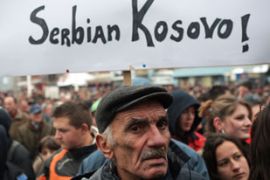UN fails to break Kosovo deadlock
US and European nations reject Belgrade’s calls for further talks on independence.

“Any move towards unilateral independence would clearly be outside the limits of international law,” Vitaly Churkin, the Russian ambassador to the UN, said.
‘Modern tragedy’
Fatmir Sejdiu, president of Kosovo, told the council the collapse of the former Yugoslavia was “one of the great tragedies of the modern era”.
| Al Jazeera in Kosovo |
|
Roma refugees return to roots |
“We are exhausted after nearly two decades of isolation, war and political limbo,” he said.
Sejdu said that the actions of Serb forces during the war in Kosovo in the 1990s had made the co-existence of Serbia and Kosovo in the same state impossible.
The EU is now set to take the lead in charting Kosovo’s future.
Wednesday’s meeting of the council was convened to discuss a report compiled by US, European and Russian mediators about two years of talks that failed to find any common ground between Belgrade and Pristina.
During the negotiations, which ended in November, Belgrade offered Kosovo, which has been administered by the UN for eight years, broad autonomy.
Hashim Thaci, Kosovo’s prime minister-elect, told the Associated Press news agency before the meeting that the province was “ready for independence”.
“We have no time to lose, to waste,” he said.
However, Vojislav Kostunica, Serbia’s prime minister, said: “Serbia will declare all unilateral acts of Albanian separatists null and void, and for Serbia the province of Kosovo will forever remain its integral and inalienable part.”
‘Supervised independence’
The British and US ambassadors said that their legal advisers were convinced that resolution 1244 provided the legal basis to implement a plan for “supervised independence” without any further council decision.
“The principle of territorial integrity is qualified by the principle of self-determination,” John Sawers, British ambassador, said.
On Friday, EU leaders rejected immediate unilateral recognition of an independent Kosovo but agreed to try to co-ordinate a phased-in recognition of the state’s independence.
Thaci has said that any declaration of independence will be co-ordinated with US and EU partners.
The Security Council meeting came the day after several thousand people protested against Kosovan independence in the predominantly-Serb north of the divided town of Mitrovica.
Dejan Anastasijevic, a Serbian journalist, told Al Jazeera that there was consensus in Serbian politics that Kosovan independence was not acceptable, but that Serbia does not have much control over the province.
